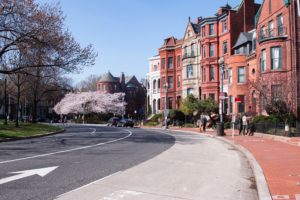Local Democracy in The District of Columbia
September 15th is designated as the International Day of Democracy by the United Nations, and this day of observance is being celebrated in the United States with a nationwide collaborative effort. As the United Nations finds that “now more than ever Democracy is backsliding, civic space is shrinking, distrust, mis- and disinformation are growing while threats to the freedom of journalists and media workers are expanding by the day”, take some time to reflect on the importance of being informed about your democracy and what allows it to be healthy and read coverage from Democracy Day partners here.
In honor of Democracy Day, the American Humanist Association is sharing the special circumstances of the government of Washington, DC, where our national headquarters is located.
Comprised of land once Piscataway and Nacotchtank (Anacostan) and parts of Virginia and Maryland, the District of Columbia (known as DC, or the District) is not your typical American city. It was established in 1790 as a federal district to be distinct from the states as well as to be a middle ground between the North and South, thus becoming legally unique in its governance.
Certainly, each state government’s structure and laws is unique, though there are the constants of the presence of an executive, judicial, and bicameral legislative branch composed of two separate legislating bodies (with one exception: Nebraska, where the legislature is unicameral). States also have federal representation with voting Senators and Representatives. DC is the odd-one out, resembling a traditional local government with some glaring caveats.
The US Constitution gives Congress exclusive, or ultimate, say over legislation in the District in all cases. After years of back and forth between allowing and demolishing forms of self-governance, in part a direct strategy “designed to suppress Black political power”, DC residents were extended the right to vote in presidential elections through the 23rd Amendment in 1961. Then, in 1973, the District of Columbia Home Rule Act passed Congress, affording DC some elective powers and control over local affairs.
Now, DC, too, consists of the executive, legislative, and judicial branches. The Mayor heads the executive branch, serves four-year terms, and functions in many ways like a “governor, county executive and mayor” all at once. The Mayor is responsible for executing the decisions of the DC Council and recommending a budget. The Council consists of thirteen members who serve four-year terms; eight of which are elected from each DC ward, and five elected ‘at large’ (representing DC as a whole), including the Council Chairman. The Council, like other legislative branches, crafts policy and passes laws in committees, oversees the executive branch, and reviews and approves the Mayor’s proposed budget. DC’s local judicial branch contains the Superior Court of the District of Columbia, which serves as the trial court, and the District of Columbia Court of Appeals, which “is the highest court and is similar to a state supreme court”.
Yet, even with the presence of a local government, Congress still maintains much control over the District’s affairs. Congress reviews any legislation or budgets that the DC government puts forth, and has oftentimes overruled democratically-made choices, such as those related to school vouchers, abortion, marijuana, control of gun violence, marriage equality, and more. District residents are not content with the lack of representation and voice in governance—an overwhelming majority (eighty-six percent) voted in support of a 2016 statehood referendum—and while in the District, you’re sure to see official license plates with the slogan “Taxation Without Representation” or “End Taxation Without Representation” on them. The calls for DC to become the 51st state have gained momentum, as evidenced by House floor passage of H.R. 51, the Washington, D.C. Admission Act, as recently as last year.
While District residents do not enjoy the same equality of power in their representation that is afforded to all other Americans, it is absolutely still important to be a registered and active DC voter. District residents make their voice heard during elections, which include, for example, for the Mayor, Council members, federal delegates, shadow delegates, and Attorney General, as well as on initiatives and referendums. Elections in DC are conducted by the District of Columbia Board of Elections, which provides and amplifies a multitude of events and resources that help ensure voters are enfranchised and informed. DC residents can register to vote here. Or, you can learn more about how to register to vote in your state here.
Being informed about our democratic institutions is only the first step to being a participant—civically engage yourself and others in the elections just around the corner. The American Humanist Association is excited to be partnering with organizations that are helping high school students register to vote and encouraging early voting. Learn more about how you can register and take local action here. You may also be interested in signing up as a poll worker in your locality—check out Power the Polls for more information.

